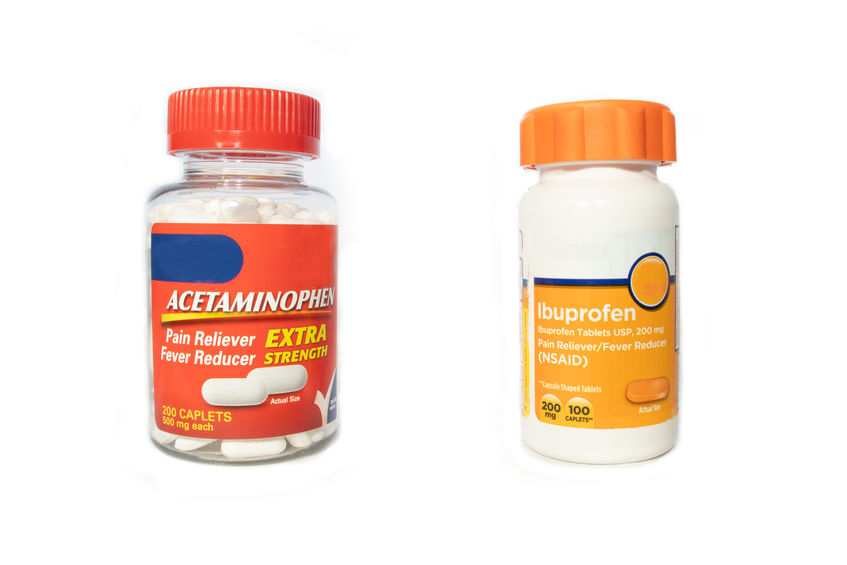Ever wonder which OTC pain reliever is best for that nagging headache or whether Tylenol or Advil will work better for your sprained ankle? Let’s review both and find out!
What do they treat and how do they work?
Acetaminophen is an OTC pain reliever that you probably know by the common brand name Tylenol. It is an effective analgesic (pain reliever) and antipyretic (fever reducer) but does not have anti-inflammatory properties. The exact way acetaminophen works is still unknown, but it is thought to relieve pain by reducing pain signals within the nervous system. It reduces fevers by acting on the heat-regulating center in your brain.
Ibuprofen is an OTC analgesic, antipyretic, and anti-inflammatory medication. It is a nonsteroidal, anti-inflammatory drug, or NSAID. You may be more familiar with brand names like Advil or Motrin. Ibuprofen works by blocking the production of prostaglandins, which are substances your body releases in response to injury and illness. Prostaglandins cause pain, swelling, and inflammation, as well as fever. Reducing the amount of prostaglandins released at the site of injury relieves pain.
Which is more effective?
Acetaminophen usually starts working within 30 minutes and will last in your body for about 4 hours. Extended release formulations can last up to 6-8 hours. The usual adult dosage is 325-1000 mg every 4-6 hours with a maximum daily dosage of 3000 mg.
Ibuprofen also starts to relieve pain quickly, usually within 30 minutes, and one dose can last for 6-8 hours. The usual adult dosage is 200-400 mg every 4-6 hours with a maximum daily dosage of 1200 mg.
If you are treating a headache, common cold symptoms, or a fever, you can use either acetaminophen or ibuprofen! Some people feel like acetaminophen works better for them, while others find ibuprofen to be more effective.
If you have muscle aches or strains, menstrual cramps, or a toothache, ibuprofen is a better choice because of its anti-inflammatory effects.
How much do they cost?
Acetaminophen and ibuprofen both cost about the same. Because they are available over-the-counter, your insurance is not likely to pay for either of these medications. Brand name formulations, like Tylenol and Advil, will cost more than generic versions.
What are some common side effects?
Acetaminophen is very well tolerated. Some people may experience side effects like:
● Nausea
● Vomiting
● Headache
Common side effects of ibuprofen include:
● Heartburn
● Nausea or vomiting
● Stomach pain
What about serious side effects?
Although both acetaminophen and ibuprofen are available over the counter, non-prescription medications still have the potential to cause serious health problems. Any over the counter pain reliever should always be taken at the lowest effective dose possible for the shortest amount of time. You should always talk to your healthcare provider or pharmacist before taking acetaminophen or ibuprofen regularly for an extended period of time.
Acetaminophen is metabolized, or broken down, by your liver. It has been associated with acute liver failure, sometimes resulting in liver transplant or death. These serious side effects are more likely to happen at doses above daily recommended limits and often involve more than one acetaminophen-containing product. You should always carefully check the labels of other OTC medications as acetaminophen is found in many other products, including cough and cold medicines. You should never combine acetaminophen and alcohol due to risk of liver injury.
Taking high doses of ibuprofen for a long time can increase your risk for more serious side effects, such as blood clots, heart attack, kidney damage, GI bleeding, and stroke. You should always take ibuprofen with food. You should not take ibuprofen if you have a history of serious cardiac issues, kidney problems, clotting disorders, or are pregnant.
TL; DR:
Acetaminophen and ibuprofen are both helpful pain relief options for common ailments like headaches and cold symptoms; they also both work well at reducing fever. Ibuprofen has anti-inflammatory properties and will work better for muscle aches and strains, menstrual cramps, and dental pain. Always follow dosing guidelines on the package and discuss with your doctor if you plan to use either medication for an extended period of time.
References:
- Barros, M. (2015). Handbook of Nonprescription Drugs: An Interactive Approach to Self-Care.
- Marion, DW. Acetaminophen. In: UpToDate, Post, TW (Ed), UpToDate, Waltham, MA, 2021.
- Marion, DW. Ibuprofen. In: UpToDate, Post, TW (Ed), UpToDate, Waltham, MA, 2021.











